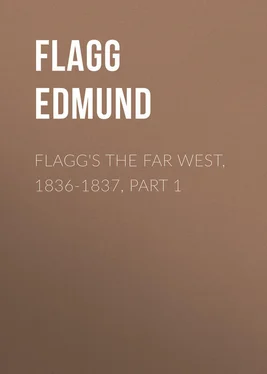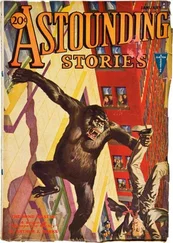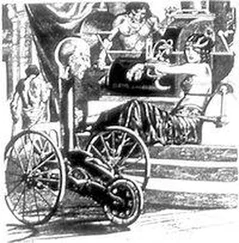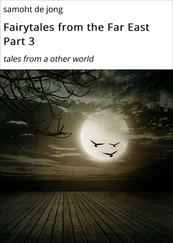Edmund Flagg - Flagg's The Far West, 1836-1837, part 1
Здесь есть возможность читать онлайн «Edmund Flagg - Flagg's The Far West, 1836-1837, part 1» — ознакомительный отрывок электронной книги совершенно бесплатно, а после прочтения отрывка купить полную версию. В некоторых случаях можно слушать аудио, скачать через торрент в формате fb2 и присутствует краткое содержание. Издательство: Иностранный паблик, Жанр: foreign_antique, foreign_prose, Путешествия и география, на английском языке. Описание произведения, (предисловие) а так же отзывы посетителей доступны на портале библиотеки ЛибКат.
- Название:Flagg's The Far West, 1836-1837, part 1
- Автор:
- Издательство:Иностранный паблик
- Жанр:
- Год:неизвестен
- ISBN:нет данных
- Рейтинг книги:4 / 5. Голосов: 1
-
Избранное:Добавить в избранное
- Отзывы:
-
Ваша оценка:
- 80
- 1
- 2
- 3
- 4
- 5
Flagg's The Far West, 1836-1837, part 1: краткое содержание, описание и аннотация
Предлагаем к чтению аннотацию, описание, краткое содержание или предисловие (зависит от того, что написал сам автор книги «Flagg's The Far West, 1836-1837, part 1»). Если вы не нашли необходимую информацию о книге — напишите в комментариях, мы постараемся отыскать её.
Flagg's The Far West, 1836-1837, part 1 — читать онлайн ознакомительный отрывок
Ниже представлен текст книги, разбитый по страницам. Система сохранения места последней прочитанной страницы, позволяет с удобством читать онлайн бесплатно книгу «Flagg's The Far West, 1836-1837, part 1», без необходимости каждый раз заново искать на чём Вы остановились. Поставьте закладку, и сможете в любой момент перейти на страницу, на которой закончили чтение.
Интервал:
Закладка:
For nothing, perhaps, have foreign tourists in our country ridiculed us more justly than for that pomposity of nomenclature which we have delighted to apply to the thousand and one towns and villages sprinkled over our maps and our land; instance whereof this same renowned representative of the Celestial Empire concerning which I have been writing. Its brevity is its sole commendation; for as to the taste or appropriateness of such a name for such a place, to say naught of the euphony, there's none. And then, besides Pekin, there are Romes, and Troys, and Palmyras, and Belgrades, Londons and Liverpools, Babels and Babylons without account , all rampant in the glories of log huts, with sturdy porkers forth issuing from their sties, by way, doubtless, of the sturdy knight-errants of yore caracoling from the sally-ports of their illustrious namesakes. But why, in the name of all propriety, this everlasting plagiarizing of the Greek, Gothic, Gallic patronymics of the Old World, so utterly incongruous as applied to the backwoods settlements of the New! If in very poverty of invention, or in the meagerness of our "land's language," we, as a people, feel ourselves unequal to the task – one, indeed, of no ordinary magnitude – of christening all the newborn villages of our land with melodious and appropriate appellations, may it not be advisable either to nominate certain worthy dictionary-makers for the undertaking, or else to retain the ancient Indian names? Why discard the smooth-flowing, expressive appellations bestowed by the injured aborigines upon the gliding streams and flowery plains of this land of their fathers, only to supersede them by affixes most foreign and absurd? "Is this proceeding just and honourable" towards that unfortunate race? Have we visited them with so many returns of kindness that this would overflow the cup of recompense? Why tear away the last and only relic of the past yet lingering in our midst? Have we too many memorials of the olden time? Why disrobe the venerable antique of that classic drapery which alone can befit the severe nobility of its mien, only to deck it out in the starched and tawdry preciseness of a degenerate taste?
Illinois River.
X
"It is a goodly sight to see
What Heaven hath done for this delicious land!
What fruits of fragrance blush on every tree!
What goodly prospects o'er the hills expand!"
"Good-evening, sir; a good-evening to ye, sir; pleased with our village, sir!" This was the frank and free salutation a genteel, farmer-looking personage, with a broad face, a broad-brimmed hat, and a broad-skirted coat, addressed to me as I stood before the inn door at Peoria, looking out upon her beautiful lake. On learning, in reply to his inquiry, "Whence do ye come, stranger?" that my birth spot was north of the Potomac, he hailed me with hearty greeting and warm grasp as a brother. "I am a Yankee, sir; yes, sir, I am a genuine export of the old 'Bay State.' Many years have gone since I left her soil; but I remember well the 'Mistress of the North,' with her green islands and blue waters. In my young days, sir, I wandered all over the six states, and I have not forgotten the valley of the Connecticut. I have seen the 'Emporium' with her Neapolitan bay, and I have looked on the 'city of the monuments and fountains;' but in all my journeyings, stranger, I have not found a spot so pleasant as this little quiet Peoria of the Western wilderness!" Whether to smile in admiration or to smile at the oddity of this singular compound of truth and exaggeration, propounded, withal, in such grandiloquent style and language, I was at a loss; and so, just as every prudent man would have acted under the circumstances, neither was done; and the quiet remark, "You are an enthusiast, sir," was all that betrayed to the worthy man the emotions of the sublime and ridiculous of which he had been the unwitting cause.
But, truly, the little town with this soft Indian name is a beautiful place, as no one who has ever visited it has failed to remark. The incidents of its early history are fraught with the wild and romantic. The old village of Peoria was one of the earliest settlements of the French in the Mississippi Valley; and, many years before the memory of the present generation, it had been abandoned by its founders, a new village having been erected upon the present site, deemed less unhealthy than the former. The first house is said to have been built in new Peoria, or La ville de Maillet , as was its nom de nique , about the year 1778; and the situation was directly at the outlet of the lake, one mile and a half below the old settlement. 95Its inhabitants consisted chiefly of that wild, semi-savage race of Indian traders, hunters, trappers, voyageurs, couriers du bois , and half-breeds, which long formed the sole link of union between the northern lakes and the southwest. After residing nearly half a century on this pleasant spot, in that happy harmony with their ferocious neighbours for which the early French were so remarkable, they were at length, in the autumn of 1812, exiled from their ancient home by the militia of Illinois, on charge of conniving at Indian atrocities upon our people, a party having been fired on at night while anchored before the village in their boats. The villagers fled for refuge to their friends upon the Mississippi. In the autumn of the succeeding year, General Howard, 96with 1400 men, ascended the Illinois; a fortress was constructed at Peoria in twelve days from timber cut on the opposite side of the lake. It was named Fort Clarke, and was occupied by a detachment of United States' troops. In course of a few weeks the whole frontier was swept of hostile Indians. On the termination of hostilities with Great Britain the fort was abandoned, and soon after was burned by the Indians, though the ruins are yet to be seen. The present settlement was commenced by emigrants but a few years since, and has advanced with a rapidity scarcely paralleled even in the West. Geographically, it is the centre of the state, and may at some future day become its seat of government. It is the shire town of a county of the same name; has a handsome courthouse of freestone; the neighbouring regions are fertile, and beds of bituminous coal are found in the vicinity. These circumstances render this spot, than which few can boast a more eventful history, one of the most eligible locales in the state for the emigrant.
Its situation is indescribably beautiful, extending along the lake of the same name, the Indian name of which was Pinatahwee
Конец ознакомительного фрагмента.
Текст предоставлен ООО «ЛитРес».
Прочитайте эту книгу целиком, купив полную легальную версию на ЛитРес.
Безопасно оплатить книгу можно банковской картой Visa, MasterCard, Maestro, со счета мобильного телефона, с платежного терминала, в салоне МТС или Связной, через PayPal, WebMoney, Яндекс.Деньги, QIWI Кошелек, бонусными картами или другим удобным Вам способом.
1
For a list of Flagg's prose and poetical writings, contributions to periodicals, and editorial works, see "Annual Report of the Librarian of Bowdoin College for the year ending June 1, 1891," in Bowdoin College Library Bulletin (Brunswick, Maine, 1895).
2
John Bidwell, "First Emigrant Train to California," in Century Magazine , new series, xix, pp. 113, 114.
Читать дальшеИнтервал:
Закладка:
Похожие книги на «Flagg's The Far West, 1836-1837, part 1»
Представляем Вашему вниманию похожие книги на «Flagg's The Far West, 1836-1837, part 1» списком для выбора. Мы отобрали схожую по названию и смыслу литературу в надежде предоставить читателям больше вариантов отыскать новые, интересные, ещё непрочитанные произведения.
Обсуждение, отзывы о книге «Flagg's The Far West, 1836-1837, part 1» и просто собственные мнения читателей. Оставьте ваши комментарии, напишите, что Вы думаете о произведении, его смысле или главных героях. Укажите что конкретно понравилось, а что нет, и почему Вы так считаете.












